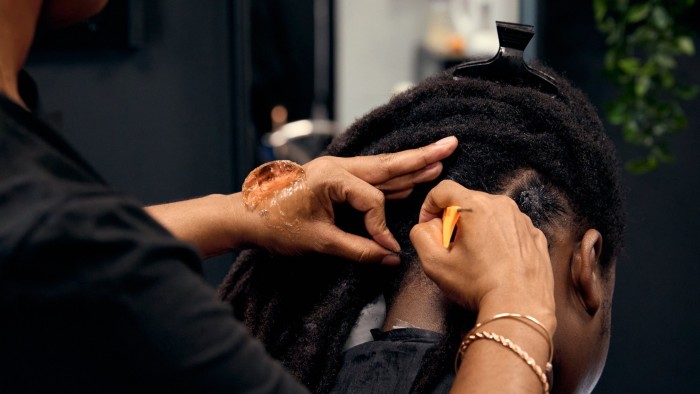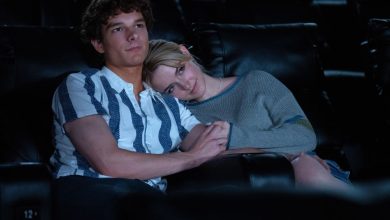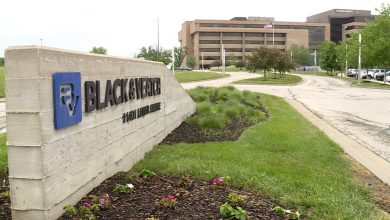inside a $10bn global industry

Unlock the Editor’s Digest for free
Roula Khalaf, Editor of the FT, selects her favourite stories in this weekly newsletter.
The business of Black hair is often conducted in the shadows.
If you look, you will find it tucked behind unassuming storefronts in east London, hidden next to money transfer shops on busy high streets, or nestled in Brooklyn brownstones where the only footprint of its existence is the low hum of music and the lingering scent of sulphur and Pink hair lotion.
Beyond the threshold is a bustling world, filled with women whose hands weave intricate patterns at impossible speeds, and patrons whose curls have become an inalienable part of their identity and their livelihoods. It is often loud and a little too warm, but you are always offered a chair, and you will leave with a story.
For the women who frequent these spaces, they are not just salons. They are a sanctuary. And the quiet comfort they provide is part of a global network that has grown from a backdoor business into an industry estimated to be worth more than $10bn in 2023 and forecast to grow to more than $15bn by 2033.
The true size of the business could be much larger. Separate research covering only the UK found Black women account for 10 per cent of total haircare spending, despite making up just 4.2 per cent of the country’s female population, according to its 2021 census.
The disproportionately large spend compared with other ethnic backgrounds is not a symptom of Black women’s vanity, experts say, but the product of sociopolitical pressure, shaped by societies in which Afro hair has rarely fitted within established norms of beauty or professionalism.
“There’s an undertone that I think a lot of people miss,” says Stephanie Cohen, a paralegal and co-founder of The Halo Collective, which campaigns for the end of racialised hair discrimination in schools and workplaces. “The sense of othering is often not deliberate, it’s systemic.”
More on Women in Business
A 2023 survey on workplace hair acceptance among senior US and UK corporate decision makers found that textured hairstyles were less welcome in the workplace than the Eurocentric ones. The researchers concluded that hair straightening could increase a Black woman’s chances of being seen as “appropriate” by 20 percentage points.
In the face of such quiet policing, entire ecosystems have formed. For some these spaces can be very high end.
“Very few hairdressers [in London] truly cater to Afro hair in its full capacity within the luxury beauty space,” says Vernon François, a UK-born, Los Angeles-based hairdresser. Before he moved to the US, François, whose client list includes tennis player Serena Williams and actor Lupita Nyong’o, “made it his mission” to fill that void. “Clients — particularly those with the means and the desire to feel seen and catered to — wanted high-quality service, expertise and an experience where they didn’t have to compromise because of their hair pattern,” he says.

It is a sentiment shared by many in the industry, including Charlotte Mensah, a British-Ghanaian hairstylist and the first Black woman to be inducted into the British Hairdressing Awards Hall of Fame. She launched her award-winning line of haircare products 10 years ago in response to client concerns. “They wanted beautiful packaging, luxurious scents and formulas that truly supported healthy hair. They wanted to feel seen,” Mensah says.
She believes the introduction of luxury Afro hair products in high-end shops is helping to shift perceptions. “It shows the world that Black women are not an afterthought,” she adds. “We live rich, diverse lives, and we deserve products that reflect that.”
Despite the clear demand for quality Afro hair products, many consumers still use some, such as relaxers, that can carry substantial health risks in an effort to look more “acceptable”.
“Most of us just want to feel like we fit in and we can move through our daily lives with ease,” says Michele Scott-Lynch, founder of curly-hair product brand Bouclème.
“The landscape has definitely shifted, but we’re still quite far behind,” Scott-Lynch adds and she has thoughts on the future of Black haircare as the industry develops. For example: “When [Black haircare entrepreneurs] sell [on] a brand [to a conglomerate] that’s been created to empower those that have been sidelined for so long, you don’t know what’s going to happen. How do you make sure that care continues?” she asks.
At The Palms, in Peckham, south London, the spirit of community and care lives on, in the form of a purpose-built Afro beauty hub. Afisa, a young trainee hairstylist, directs a woman in her chair towards a freestanding hooded dryer. “The first day I got here, I was comfortable,” Afisa remarks, encouraging coos of delight and halfhearted teasing from the room. “It doesn’t feel like work. It’s more of a family environment”.

Meanwhile, Kaywanna Samuel, a seasoned loctician, a specialist in dreadlock styling, is nearing the end of a “retwist”. “When our hair is cared for properly, it is truly beautiful,” Samuel declares, gesturing around the room. . “It’s community . . . women and men in the same space getting their hair done and bonding with each other. This is the beauty of what we do.”




